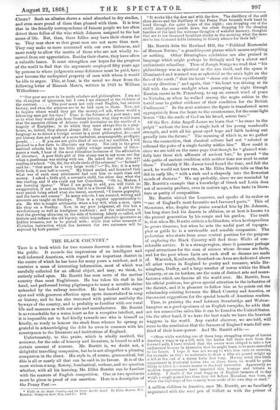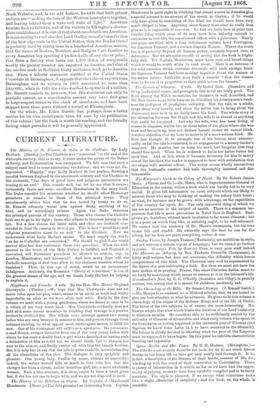THE BLACK COUNTRY.*
This is a book which for two reasons deserves a welcome from the public. It records the impressions of an intelligent and well informed American, with regard to an important district in the centre of which he has been for many years a resident, and it contains a mass of interesting information, most of which was carefully collected for an official object, and may, we think, be entirely relied upon. Mr. Burritt has seen more of the mother country than most Englishmen. He has taken his staff in his hand, and performed loving pilgrimages to many a notable shrine unheeded by the railway traveller. He has looked with eager eyes and with generous affection upon spots immortalized in song or history, and he has also traversed with patient assiduity the byways of the country, and is probably as familiar with our rural life and manners as with our arts and manufactures. Mr. Burritt is as remarkable for a warm heart as for a receptive intellect, and it is impossible not to feel kindly towards one who is himself so kindly, so ready to honour the stock from whence he sprang, so grateful in acknowledging the debt he owes in common with his countrymen to the literature and institutions of England.
Unfortunately, to this praise, which is wholly merited, the reviewer, for the sake of honesty and literature, is bound to add a certain amount of censure. Mr. Burritt is, we doubt not, a delightful travelling companion, but he is not altogether a pleasing companion in the closet. His style is, of course, grammatical, but this is all or nearly all that can be said in its favour. It is of the most vicious stamp, flowery, bombastical, verbose, and we question whether, with all his learning, Mr. Elihtt Burritt can be familiar with the masters of English composition. One or two specimens must be given in proof of our assertion. Here is a description of the Penny Post :—
Walks in the Black Country and its Green Border Land. By Elihu Burrin, London: Sampson Low, Son, and Co. 1565.
"It works like ths dew and with the dew. The distillery of the still skies above and the distillery of the Penny Post beneath work hand in hand through the quiet hours of the night ; one dropping out of the starlit atmosphere gentle dews, the other dropping for the sleeping families of the land the welcome thoughts of wakeful memory, thoughts that are to ten thousand breakfast circles in the morning what the dews are to ten thousand fields listening in thirsty silence for their fall."
Mr. Burritt dubs Sir Rowland Hill, the "Political Economist of Human Nature," a grandiloquent phrase which means anything or nothing. Other Birmingham celebrities are also praised in language which might perhaps be fittingly used by a clever and enthusiastic schoolboy. Thus of Joseph Sturge we read that "his philanthropy was as spherical as the itself, and the space it illuminated and warmed was as spherical as the sun's light on the face of the earth ;" that his heart "shone out of hitu equidistantly in every direction ;" and again, that " his heart was shining at its full with the same sunlight when journeying by night through Russian snows to St. Petersburg, to say an earnest word of peace to Nicholas, as when he walked among the negro cabins in the torrid zone to gather evidence of their condition for the British Parliament." In the next sentence the figure is transferred more appropriately from the heart to the countenance, for the same light beams "like the smile of God on his broad, serene face."
Of the Rev. John Angell James we learn that "lie came to the pulpit" without the loss of a single lock of his young manhood's strength, and with all his great-eyed hope and faith looking out grandly into the future." The meaning of which is, as we gather from the connection, that classical culture had not "sobered or softened the pulse of a single faculty within him." How could it since we are told on the same page that though he "glanced wist- fully into those rich affluents of ancient lore," he passed "the side-paths of ancient erudition with neither titne nor need to enter them." Probably if Mr. James hand found the time, and felt the need, he would not have run, as Mr. Eau Burritt tells us that he did in early life, "with a rush and a rhapsody into the floweriest meads of rhetoric." We say probably, since we are reminded by Mr. Burritt's example that a knowledge of Greek and Latin does not of necessity produce, even in mature age, a flue taste in litera- ture or purity of composition.
Mr. Burritt visited the Leasowes, and speaks of its maker as "one of England's most favourite and favoured poets." This of Shenstone, who, despite the praise awarded him by Dr. Johnson, has long since had his deserts in oblivion, or at best is known to the present generation by his essays and his garden. The truth is, that when Mr. Burritt criticizes he blunders, when he rhapsodizes lie grows tiresome, but when he acts the useful part of topogra- pher or guide he is a serviceable and sensible companion. The pedestrian who starts from some central position for the purpose
of exploring the Black Country will find these Walks of con- siderable service. It is a strange region, since it possesses perhaps equal attractions for the man of science whose dreams are facts, and for the poet whose facts are such stuff as dreams are made of. Warwick, Kenilworth, Stratford-on-Avon are dedicated above all other towns in England to poetry and romance, while Bir- miugham, Dudley, and a large number of towns within the Black Country, or on its borders, are the seats of distinct arts and manu-
factures which are famous all the world over. Mr. Burritt, from his official position, has given special attention to the industries of the district, and it is pleasant to follow him as ho points out the relationship existing between the Black Country and America, or throws out suggestions for the special benefit of American readers.
Thus, in praising the road between Stourbridge and Wolver- hampton as a good specimen of an English turnpike, he adds that not ten consecutive miles like it can be found in the United States. On the other hand, if we have the best roads we have the heaviest waggons in the world. Any careful observer, we are told, will come to the conclusion that the farmers of England waste full one- third of their horse-power. And Mr. Burritt adds :—
" Often while watching one of these long, straggling strings of horses drawing a waggm up a hill, with the leader full three rods from tho forward axle, 1 have wished that the owner were obliged to take a few rudimental lessons in dynamics, that he might learn to be more merciful to his beasts. I hope it was not wrong to wish him such an exercise, for example, as this : to undertake to draw a fifty-six-pound weight up a hill at the end of a string forty foot long. Having tried this little experiment in tractorial forces two or three times, Ito would be quite likely to bitch 1115 horses nearer to the load thereafter. Apparently no modern improvements have impaired this homage and tribute to solidity. I doubt if the road waggons of English farmers of to-day weigh a single pound less than they did before Macadam was born, or when the highways of the country were made of its own clay or sand."
A million children in America, says Mr. Burritt, are as familiarly acquainted with the steel pen of Gillott as with the primer of Noah Webster, and, in his odd fashion, be adds that both primer and pen are "making the tour of the Western hemisphere together, and leaving behind them a wave and wake of light." American tourists flock to Gillott's, and of the visitors to Elkington's electro- plate establishment it is stated that about one-fourth are American. It is interesting to read also that Lord Dudley manufactures the iron of the best edge tools in the United States, that the Brades trowel is probably used by ninety-nine in a hundred of American masons, that the names of Barlow, Butcher, and Rodgers "are familiar to every American boy sporting a pocket-knife of any size or price," that from 0, factory that turns out 1,100 dozen of currycombs weekly the greater number are exported to America, and that of the needles made at Redditch thirty millions a week go to America also. From a tabular statement certified at the United States Consulate at Birmingham, it appears that the value of exports from Birmingham and its vicinity in 1865 amounted to more than 540,0001., while in 1866 the value reached to upwards of a million. Mr. Bnrritt reminds us, however, that this statement can only be partially correct, as a considerable amount may have first gone to large seaport towns as the stock of merchants, and have been shipped from those ports without a record at Birmingham.
On the whole, Mr. Elihu Burritt has, perhaps, done a better service for his own countrymen than for ours by the publication of this volume; but the book is worth the reading, and the friendly feeling which pervades it will be generally appreciated.































 Previous page
Previous page